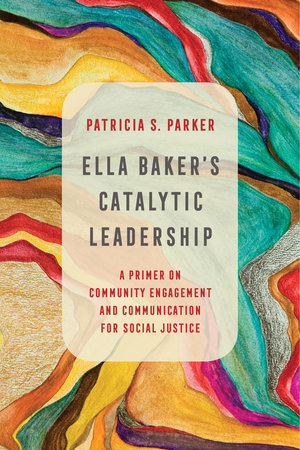by Patricia S. Parker, author of Ella Baker’s Catalytic Leadership: A Primer on Community Engagement and Communication for Social Justice
When former Vice-President Joe Biden accepted the Democratic Party’s nomination as President of the United States in August, he began his remarks with a reference to Ella Baker. “Good evening” he said. “Ella Baker, a giant of the Civil Rights Movement, left us with this wisdom: ‘Give people light and they will find a way.’ Give people light. Those are words for our time.”
At a moment when much of the world may have been watching to see what Mr. Biden would say, how he would make the case for his presidency at this critical time in history, he chose to spotlight one of the most influential, yet unheralded, architects of the U.S. Civil Rights Movement.
In my new book, Ella Baker’s Catalytic Leadership: A Primer on Community Engagement and Communication for Social Justice, I make the case for why Ella Baker’s wisdom is as relevant now as it was in the 50’s and 60’s. As a civil rights and human rights activist whose career as a community organizer spanned more than fifty years, she left us with tools and lessons on how to catalyze the power of everyday democracy through community-based collaborations.
Ella Baker’s group-centered organizing philosophy focuses on creating and cultivating leaders from the grassroots up and not from the top down. As I detail in the book, her approach incorporates time-tested organizing tools for communication advocacy, but these tools are not the means to an end. Rather, the focus is on meeting people where they are and taking into account how white supremacy, patriarchy, and extreme capitalism are operating in a particular context. Developing a critical consciousness about those conditions and the root causes of them is one of many responses and perhaps often not the first or obvious one. Ella Baker’s focus was on developing the capacity to discern the seeds of critical consciousness in a community and nurture and grow that into collective leadership for social justice.
For the past 15 years, I have put Ella Baker’s philosophy into practice, translating what I understand as her catalytic leadership approach. My book describes the first six years of that work, the lessons learned through trial and error, and a set of commitments and practices that others can apply in their efforts. The book is based on a case study of a small collective of African American teen girls and their parents, university faculty, students, and community activists learning leadership in the spirit of Ella Baker. Our collective’s social justice work takes place in College Town, a fictionalized name used to signify the racialized spaces where historically White universities are situated in or near historically Black communities. Those racial dynamics are manifested in the over-policing of Black bodies and persistent inequities in health, education, housing, and employment.
From this case study, readers will find detailed illustrations for entering, engaging, and catalyzing community-based collaborations. They will also find concrete communication practices for coalition building and solidarity in social justice activism. Most importantly, I think readers will benefit from the deep self-critical work I reveal in the book as I confront the limits and possibilities of alliances that involve people like me from outside a community engaging with people in vulnerable life situations.
Ella Baker was a masterful bridge leader. My hope is that readers will be inspired to follow her example as I did in College Town.
College Town could be Any Town. The outrage over George Floyd’s murder this past May sparked protests in cities and rural areas across the US and around the world. People from all backgrounds have marched in support of the Black Lives Matter Movement and are calling for the kind of social justice leadership and transformative change modeled in Ella Baker’s praxis. I see the spirit of Ella Baker in the current work of community-based activists, like Kandace Montgomery, part of the lead team in Black Lives Matter Minneapolis; the leaders of the Black Youth Project of Durham, North Carolina; and others from around the US and globally, who have been laboring in their communities to dismantle structural racism and work toward a true democracy, as Ms. Baker envisioned. My book is meant to honor that work and catalyze others like it.
I don’t know what Joe Biden intended with his reference to Ella Baker’s legacy. I do know that for too long, what Black women have learned through centuries of antiracist and antisexist organizing has been co-opted, taken for granted, or ignored. That tradition of social justice leadership can and should be engaged in the current moment of political ferment. Ella Baker’s praxis—the connection of theory to practice—can lead the way.

